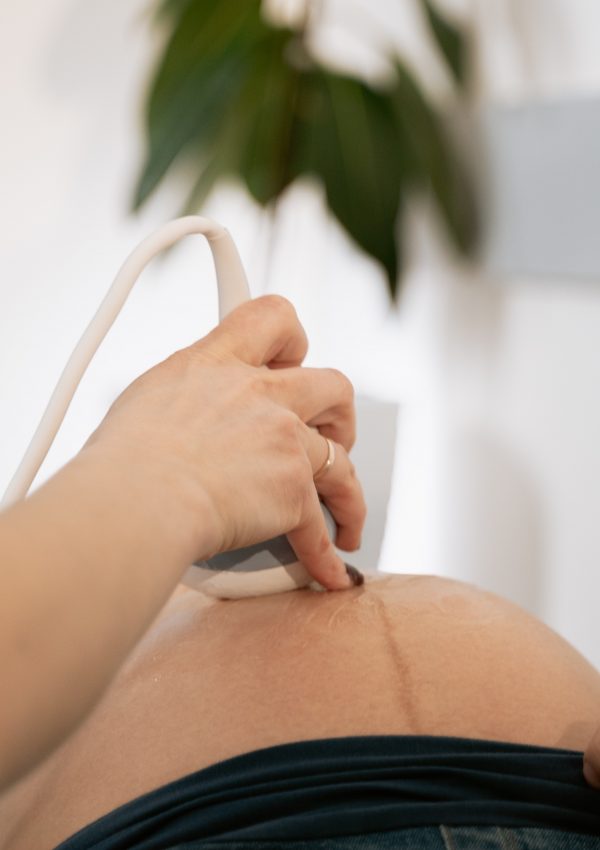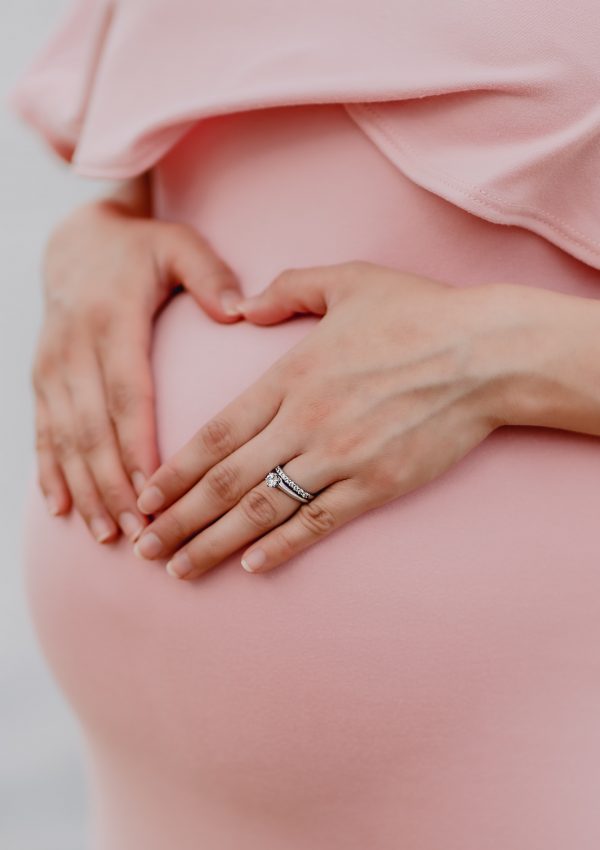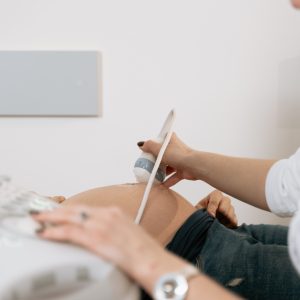Recently entered your second trimester and looking for what to expect at your prenatal check-ups? Here’s is the ultimate guide!
This post may contain affiliate links, which means I’ll receive a commission if you purchase through my links, at no extra cost to you. Please read full disclosure for more information.
Note: This guide is based off of my experience while I was pregnant. It’s meant to simply show you what to expect at prenatal check-ups and shouldn’t be taken as medical advice.
The second trimester is widely known as the best trimester for many reasons. There is no more dreaded morning sickness, your skin is probably glowing, your hair looks great, and you’re not too big to put your own shoes on.
Your second trimester prenatal check-ups will likely be pretty quick. If you’re having a healthy pregnancy you may think ‘well if all they’re going to do is check my weight and blood pressure, I can do that at home.’ But that shouldn’t be the case. It’s important to go to all of your appointments even if you think there’s nothing wrong.

This post is all about what to expect at your second trimester prenatal check-ups.
How long is the second trimester?
The second trimester is from week 14 through the end of week 27. To find out how far along you are, you just need to know the first day of your last period and how long your cycles tend to be. Then you can plug that info into an online calculator like this one.
How many prenatal check-ups do you have in the second trimester?
Just like the first trimester, you’ll have prenatal check-ups every 4 weeks, unless you are high-risk.
Your visit schedule may look like this: 16 weeks, 20 weeks, 24 weeks. Then by the time you go for your 28th week appointment you’ll be in your third trimester.
Routine Procedures
Just like in your first trimester, there will be a few routine procedures that will be done at every prenatal check-up. If you’re not high-risk, this is most of what will be done at all of your visits:
Check your weight
Your doctor will want to make sure to monitor your weight throughout your entire pregnancy. The average weight gain in the second trimester is 1 pound a week, which totals about 14 pounds.
You can gain more or less than this amount, everyone’s different! What matters is that your doctor gives you the OK that everything is fine. Rapid weight gain could be an indication of preeclampsia or gestational diabetes, so you want to make sure you’re going to all of your appointments even if you feel like everything is fine.
Check your blood pressure
Like your weight, your blood pressure will also be closely monitored throughout your pregnancy. It’s monitored because high blood pressure could also be an indication of preeclampsia. Your caretaker will want to know about that immediately and take necessary precautions.
If you think you may have issues with high blood pressure, try drinking more water and limiting salty foods. Exercise usually helps too but you want to ask your doctor first about what types of exercises are safest. In addition, try asking about calcium and magnesium intake. Those two vitamins are known to work together to improve blood pressure.
Take a urine sample
A urine sample can test for sugar and protein. Too much sugar in your urine could mean that you have gestational diabetes and too much protein could be an indicator of preeclampsia.
Urine samples may not seem like a big deal but they’re always testing for larger issues, which is better for you and baby in the long run.
Check the fetal heart rate
In the second trimester, your baby’s heartbeat will be quicker to find. Your caretaker will likely use a doppler to check or they could use a stethoscope! They will check to make sure the heart rate is not too fast or too slow. On average, a fetal heartbeat during the second trimester should be between 110 and 160.
Measure your fundal height
Your fundal height is a measurement of how big your belly is getting using a tape measure. It’s done starting in the second trimester in most cases because that’s when you typically start showing. Not all doctors do it but it could give an idea of fetal growth without doing an ultrasound.
Common questions your doctor will ask at your second trimester prenatal check-ups
Are you feeling any contractions?
At around 20 weeks, many women start to feel what are called Braxton-Hicks contractions. Braxton-Hicks contractions are otherwise known as ‘false contractions’ because they don’t signal real labor. They feel like your stomach is getting tight, then they release.
You can tell the difference between these and preterm labor by paying attention to the frequencies. Braxton-Hicks contractions are irregular and can happen based on your positioning. If you change positions or walk around and they stop, it’s not preterm labor. Try drinking water if they’re getting painful.
If you are in preterm labor, the contractions will become more intense and you won’t be able to talk through them. If this is this case, call your your doctor immediately.
Have you felt the baby move yet?
Beginning at 18 weeks, you may start to feel your baby move! This is such an exciting time. If it’s your first pregnancy you may not know what the kicks feel like or you may not feel them at all.
If you don’t feel any movement at 18 weeks don’t worry, many don’t feel anything until about 22 weeks. It should feel like bubbles or like you have butterflies in your belly. Think light taps.
Have you had any vaginal spotting or bleeding?
Vaginal spotting or bleeding can be signs that something is wrong so your doctor will want to know about those things immediately. Especially if it’s accompanied with cramping or dizziness.
Questions you should ask at your second trimester prenatal check-ups
Here are some good ideas of what to ask during your second trimester:
- What are the signs of high blood pressure?
- Should I still be feeling nauseous?
- Is it safe to go to the nail salon?
- Can I get a prenatal massage?
- When should I feel the baby move?
- What do the baby movements feel like?
- What signs do I look for if something is wrong?
- Is it safe to dye my hair?
- What symptoms are normal?
- Do you recommend the Quad Screen given my genetic history?
- What type of spotting is normal?
- Is it safe to sleep on my back? When do I start sleeping on my side?
Second Trimester Standard Tests
Glucose Screening
The glucose screening is a test for gestational diabetes, which is a type of diabetes that only occurs during pregnancy. It’s done by giving a glucose tolerance test.
What they do is they give you a very sweet drink then measure your blood glucose levels after 1 hour. If it’s too high, then your doctor will have you do a 3 hour test.
The 3 hour test works the same way as the 1 hour test but your blood glucose levels will be drawn every hour for 3 hours. If your blood glucose levels are too high at the end of the three hours, you may be diagnosed with gestational diabetes. Gestational diabetes is nothing to worry about! You may just need to see a nutritionist and do safe exercise.
In order to prepare for this screening, your doctor may have you fast. If you are allowed to eat or drink, you want to avoid carbs or anything with sugar. Eggs, for example, are a great option!
Ultrasounds
Level 2 Ultrasound
In your second trimester, you will have your most detailed ultrasound. It’s called the Level 2 Ultrasound or Anatomy Ultrasound and it usually lasts for about an hour. It’s performed between 18 to 22 weeks and checks for the baby’s overall growth. If you are considered high-risk (i.e. carrying multiples), you may have more than one Level 2 ultrasound.
The ultrasound tech will measure these key organs and body parts:
- Baby’s length from head-to-toe
- Belly circumference
- Head circumference
- Arm and leg length
- Heart including its 4 chambers
- Spine
- Brain
- Stomach
- Genitalia
- Bladder
- Kidneys
- Amniotic fluid
The reason for doing such a detailed ultrasound is to catch any potential issues and to ensure that the baby’s growth is right on track.
Lastly, you would be finding out the sex of the baby at this ultrasound so if you’re team green, make sure you let your tech know!
Optional Tests
AFP/Quad Screen
The AFP or Quad Screen is a type of genetic screening similar to the NIPT (Non-Invasive Prenatal Screening). It’s called the quad screen because it measures 4 different substances in your blood:
- AFP: A protien your baby makes as its developing
- hCG: A hormone that’s only produced during pregnancy and it’s made by the placenta
- Estriol: A hormone made from the baby’s liver and the placenta
- Inhibin A: A hormone secreted by the placenta
Depending on the levels of these substances, your baby could have a chance of developing Down Syndrome or neural tube defects. Your doctor may suggest further testing should any of your results come back positive.
RELATED POST: What To Expect At Your First Trimester Prenatal Check-Ups
This post was all about what to expect at your first trimester prenatal check-ups.




